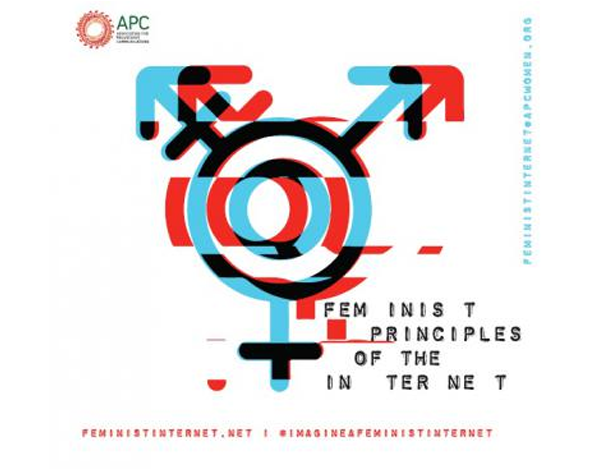Why we need Feminist Principles of the internet
Feminists disrupt systems, spaces, events that oppress, violate and exclude us from living freely, expressing our desires and creating alternative, safe and realised lives. The internet is a space, a platform, a digital connector that we are increasingly using to agitate, communicate and mobilise. As state surveillance of activists increases, misogynist trolls play out their violences, companies mine our data and invade our privacy, we need to disrupt and claim the Internet!
Through collective activism, linking movements and understanding the nature and governance of the Internet, feminists have started the collective disruption by imagining a Feminist Internet.
#ImagineAFeministInternet
The Association for Progressive Communications Women’s Rights Programme (APC WRP) started imagining a Feminist Internet through organising a Global Meeting in 2014 and a second in 2015, which brought together participants from six continents comprising gender and women’s rights activists, LGBTQI (lesbian, gay, bisexual, trans* and intersex) movements, Internet and technology rights organizations, and human rights advocates. We talked about the politics of the Internet, the nature and depth of harms that women experience everyday, how this online violence is part of a continuum of gender based violence.
We debated intersections of gender, sexuality, and the Internet – not only as a tool – but as a new public space. We started bridging the gap between feminist movements and Internet rights movements and exploring intersections and strategic opportunities to work together as allies and partners to ask the question:
"As feminists, what kind of Internet do we want, and what will it take for us to achieve it?"

The first meeting developed a set of 15 feminist principles of the Internet designed to be an evolving document which welcomes continual input, stories and experiences that informs our work on gender and technology. The evolution continues and we currently have 17 principles of the internet arranged into 5 clusters of
- Access
- Access to the Internet
- Access to Information
- Usage of Technology New Principle - Mouvements and Public Participations
- Resistances
- Transformative Medium
- Decision making in internet governance - Economy
- Alternative Economies
- Free and Open Source - Expression
- Amplifying Feminist Discourse
- Freedom of Expression
- Pornography and "harmful content" - Agency
- Consent New Principle
- Online violence
- Anonymity
- Privacy and Data
- Children and Youth
- Data
This preamble sets the context:
“A feminist internet starts with and works towards enabling more women and queer persons – in all our diversities – to enjoy universal, affordable, unconditional, and equal access to the internet.”
But what does this mean to us?
Here we explore 2 of the FPI clusters using case studies to make real why engaging with the politics of the internet as feminists is so critical to our activisms and movements.
Agency
“On July 15 Qandeel Baloch was murdered by her brother, claiming that it was a matter of family ‘honour’. One of Pakistan’s most famous and outspoken social media stars, Ms. Baloch used social media platforms to express herself, where she would share her thoughts, opinions and visual media. Her posts would at times poke fun at male Pakistani public figures and celebrities, and often were an exposé of the “hypocrisies of a patriarchal society dominated by a narrow-minded, self-righteous moral police”, according to the blog No Country For Bold Women.
This self-righteousness, a part of public media and social media discourse in Pakistan, regards the right to privacy and to anonymity as mere obstacles to getting the “truth” out, regardless of the very real consequences that it can have. By violating her right to privacy and broadcasting detailed personal information, without any understanding of what that could entail, a woman was killed - and there is still no conversation about privacy in Pakistan.”
Source: GenderNet
The murder of Qandeel highlights how essential both privacy and anonymity are to our online identities, expression and autonomy.
Under the cluster of Agency the FPI’s explore privacy and data with consent embedded centrally as:
“ Surveillance by default is the tool of patriarchy to control and restrict rights both online and offline. The right to privacy and to exercise full control over our own data is a critical principle for a safer, open internet for all.”
“It is our inalienable right to choose, express, and experiment with our diverse sexualities on the internet. Anonymity enables this. Anonymity enables our freedom of expression online, particularly when it comes to breaking taboos of sexuality and heteronormativity and experimenting with gender identity.”
To remain anonymous is often deeply important for our lives, safety and open expression as clearly seen in the murder of Qandeel.
Movements and public participation
“The internet is a transformative political medium. It facilitates new forms of citizenship that enable individuals to claim, construct, and express selves, genders, and sexualities. This includes connecting across territories, demanding accountability and transparency, and creating new opportunities for feminist movement-building.”
Our feminist movement building is often facilitated by the Internet and digital tools.

Our feminist movement building is often facilitated by the Internet and digital tools. We are increasingly seeing how much the Internet, as a political space, matters to our mobilising on an individual and collective level. The binary between offline and online mobilising is blurring as our activism increasingly embraces both for greater inclusion, amplifying struggles and more visible advocacy.
In November 2014, a Kenyan woman was stripped naked in broad daylight by a mob of men at a city bus stop in Nairobi for what she was wearing and the brutal attack was caught in graphic detail on a subsequently viral and later-deleted video on YouTube. Women responded by taking to the streets in their hundreds to defend their right to wear what they choose and uniting under the hashtag #MyDressMyChoice.
The Internet has contributed to movement building in constructive ways but can be disabling when we ignore the embedded power inherent in the internet both within and outside of our movements. Being aware of how online gender-based violence is pushing back women’s voices and challenging the ability of women's movements to organise is important to understand as we claim the Internet as an important public/political space.
Exploring our own technology practices within our movement building enables us to change particular kinds of exclusion by age, identity, location etc.and questioning whether online feminism exacerbates unequal power relations within women's movements.
Florencia Goldsman remarked about the importance of why we need to imagine and work towards a feminist internet.
“We can no longer draw a line between what is real and what is virtual. We need to make decisions about the Internet in which we circulate, live and build political participation. If the architecture of the internet continues to be decided by small circles of white Anglophone men, the programmes, codes and languages available for our information will continue to be dangerously alien. Because we want to be free at every level, let us imagine a feminist internet and build it together.”
